
views
Addressing Formal Envelopes
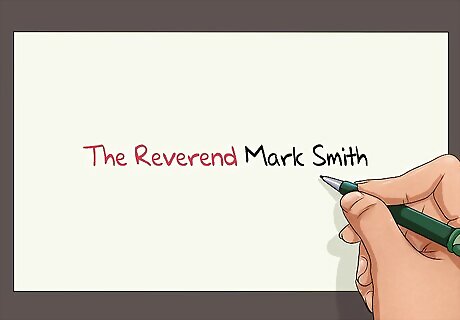
Use the title “The Reverend” on formal envelopes. Write “The Reverend” followed by the pastor’s full name on the exterior envelope. This formal title is appropriate for both Protestant and Catholic denominations of Christianity. This would be the most typical way of addressing the pastor, if you were inviting them to an event or sending a formal request, for example. If your pastor’s name is Mark Smith, you would address your envelope “The Reverend Mark Smith.” Gender does not matter. The title is the same. Jill Poe would be “The Reverend Jill Poe.” If both people in the couple are pastors and share a last name, you address them both as “The Reverends” and then the last name. So pastors Joe and Sally Carr would be “The Reverends Carr.”

Include degrees for any pastors with doctorates. List the pastor’s degree at the end of the name, or add “Dr.” after the religious title. This ensures that you give the pastor their full formal title based on their vocation and education. This applies to degrees for Doctors of Ministry, Doctors of Theology, Doctors of Divinity and most other applicable religious doctorates. If your pastor Mark Smith has a Ph.D, you would address the formal envelope “The Reverend Dr. Mark Smith” or “The Reverend Mark Smith, Ph.D.” Both are equally acceptable.

Address the spouse separately with any appropriate titles. Address the spouse of the pastor after the pastor on the envelope, unless the spouse is in the military. If you don’t know of any special titles, use Mr., Mrs., or Ms., whichever is most appropriate. For a male pastor with a wife, you would write, “The Reverend and Mrs. Mark Smith.” If they don’t share a last name, you would write, “The Reverend Mark Smith and Ms. Molly Doe.” For a female pastor with a husband, you would write, “The Reverend Zoe Deen and Mr. John Deen.” If they don’t share a last name, you would write, “The Reverend Zoe Deen and Mr. John Canton. If the pastor's spouse has another title that is more appropriate than Mr., Mrs., or Ms. you should use that title, instead. This might be the case when the spouse has a doctorate. For example, for a pastor with a spouse who is a doctor, you would write, “The Reverend Jim Price and Dr. Samantha Price” or “The Reverend Maxine Su and Dr. James Su.”
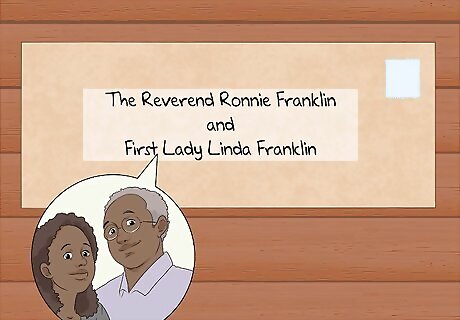
Find out if the congregation is historically African-American. In many black churches, the wife of the pastor is known as the “First Lady.” You should address her as such after the pastor on your formal correspondence, if this applies. Consult with a member of the congregation to see if the church uses this custom before using this title. There is no such corresponding title if the pastor is a woman and her husband is a man. A male pastor and his wife in such a church would be addressed, “The Reverend Ronnie Franklin and First Lady Linda Franklin.”
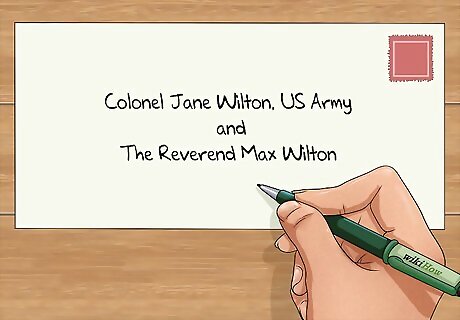
Factor in military rank when addressing a formal letter. Place the spouse before the pastor on the envelope if they are member of the armed services. Use the person’s military title as well as the branch of the military they serve in. A member of the military, whether active or retired, has higher social standing than a civilian, which is the reason they appear first. For example, you would address a pastor and his wife who is a colonel as follows, “Colonel Jane Wilton, US Army and The Reverend Max Wilton.”
Sending Emails or Other Casual Correspondence
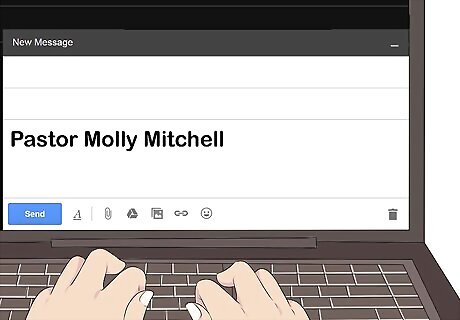
Use “Pastor” to address Protestant pastors. Pair “Pastor” with the pastor’s full name for leaders of Protestant denominations in everyday correspondence. Casual communication such as emails and quick handwritten notes don’t require the etiquette and formality of event invitations. This is a polite and effective way to speak with your pastor. If you were writing a casual thank you note, you might begin, “Pastor Molly Mitchell.”

Use “Reverend” to address Catholic priests of all denominations. Use the title “Reverend” with the priest’s full name in informal correspondence. This will ensure that you’re showing respect, but this more casual form of communication doesn’t require the ceremonial “the” that appears on formal envelopes. If writing an email, you might start, “Reverend John Smith.” There are fewer rules regarding very casual correspondence. If you know the priest well, it may make sense to use the more casual address “Father.” So for example, “Father John Smith.” Marriage is uncommon in the Catholic Church. If you’re in doubt as to the faith leader’s denomination, but know they are married, assume they are Protestant.
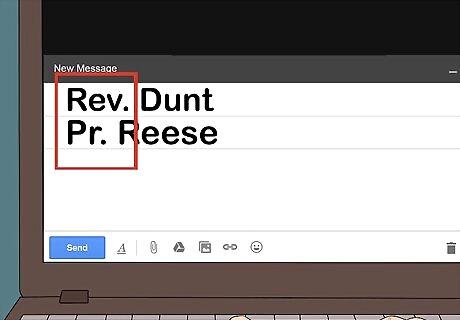
Use casual abbreviations if desired. If it suits you and the message you’re writing, you can abbreviate reverend to “Rev.” and pastor to “Pr.” Pair these abbreviations only with the pastor or priest’s last name. This is a very casual way of addressing the clergy, and it might make sense if you were sending a quick follow up email about a previous matter, for example. For example, you could address Reverend Max Dunt as “Rev. Dunt.” Similarly, you could address Pastor Lindy Reese “Pr. Reese.”
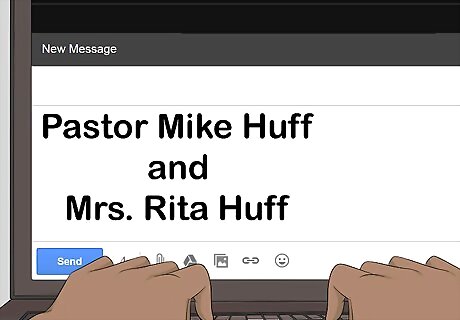
Address the spouse with their normal title and full name. Use abbreviated everyday titles, such as Mr., Mrs., Ms., and Dr. with the spouse’s full name. There is no need to include academic degrees after the name or branches of the military, if applicable. For example, you would address a Protestant pastor and his wife of the same last name as “Pastor Mike Huff and Mrs. Rita Huff.” If Mrs. Huff were a doctor, you would address them as “Pastor Mike Huff and Dr. Rita Huff.” If the congregation were one that uses the “First Lady” terminology, you might address them as “Pastor Mike Huff and First Lady Rita Huff.”
Talking in Person

Address Protestant pastors as “Pastor” with their last name. In person, it is best to keep things respectful but casual. Call your Protestant pastor “Pastor” and then their last name. For example, you could call a pastor named Jill Shannon “Pastor Shannon.” Some congregations are more familial and casual than others. If this seems like it applies to your situation, you might try calling your pastor “Pastor” and their first name (For example, “Pastor Jill”) or even simply “Pastor.” You can ask your pastor what they like best.

Address Catholic priests as “Father” with their last name. Call the priest “Father” and then their last name in casual settings such as after mass. This is an informal greeting that still respects the priest’s authority. For example, you would address a priest named Don Everton as “Father Everton.” Some parishes like to keep things very casual, in which case the priest may simply go by “Father” and his first name (for example, “Father Don”) or even simply “Father.” You can ask your priest what he prefers to be called to avoid any confusion.

Use the spouse’s typical title with their last name. Address the spouse of the pastor as Mr., Mrs., Ms., or Dr. and their last name, whichever is most appropriate. This keeps things personal but respectful, particularly if you don’t know them well. For example, you might call a pastor’s husband, “Dr. Johnson,” if he is a dentist. Similarly, you might call a pastor’s wife who does not share his last name, “Ms. Wells.” If the congregation is one that uses the term “First Lady” outlined in part one, use the title with only her last name. Pastor Michael Jones’s wife Donna would be addressed, “First Lady Jones.”

Switch to a first-name basis if requested. It is most important to show the pastor respect as a valued community member, which means calling them whatever they prefer to be called. If your pastor requests that you call them by their first name, feel free to do so. It is then acceptable to apply the same rule to their spouse, as they have indicated the level of formality they prefer.



















Comments
0 comment